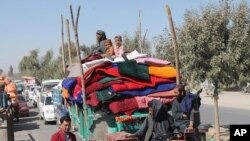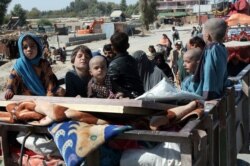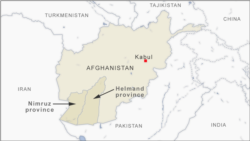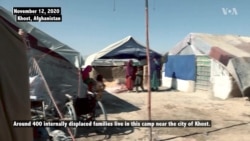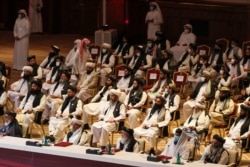A Taliban onslaught on the southern province of Helmand has forced thousands of Afghans to flee their homes, with provincial officials warning of a "human tragedy" due to a lack of essentials needed to protect the displaced from the looming cold season.
"Winter is coming, and displaced families in Lashkar Gah need assistance," Sayed Mohammad Ramin, Helmand's provincial director for refugees and returnees, told VOA. "If the fighting continues and assistance is not provided on time, God forbid, we will witness a human tragedy in the province."
The Taliban launched their offensive Oct. 10 to take Lashkar Gah, the provincial center of Helmand. As the group began making territorial gains in and around the city, thousands of residents fled to areas remaining under government control.
According to the U.N. Assistance Mission in Afghanistan (UNAMA), the intense fighting in the first four days alone displaced 35,000 people.
In a tweet, UNAMA said both sides should "take all feasible measures to protect civilians, including safe paths for those wishing to leave the area."
After weeks of fighting, Afghan officials say government forces have pushed the Taliban out of the city. Despite the government counterattack, only 50 to 100 families have returned to their homes, Ramin said.
The Afghan government said its focus now is to clear the adjacent districts of Nawa and Nad Ali from the Taliban.
Some Afghans who were displaced because of the recent violence told VOA that the situation in Lashkar Gah remained highly volatile, with the Taliban still controlling some areas and blocking roads into the city.
"It won't be possible for us to go back to our houses this winter. It is not safe," said Sayed Ahmad, a 39-year-old chef with Doctors Without Borders, who fled with his family of 14 when the Taliban advanced toward the Bolan area of Lashkar Gah.
"We were taken by surprise, and we did not find time to even think what to take with us," Ahmad said, adding that his family was only able to take some of their clothes when the gunfire began.
He said his family stays at his uncle's house with nine other families who were displaced by the violence. The overcrowded house is better than living in makeshift tents or going back to the Bolan violence, Ahmad said.
According to the U.N. Office for the Coordination of Humanitarian Affairs, fighting from Jan. 1 to Oct. 29 has displaced about 280,000 people in Afghanistan.
The Internal Displacement Monitoring Center reported nearly 3 million displaced people in Afghanistan by the end of 2019.
"For the time being, our focus is on the recently displaced families living in Lashkar Gah City," said Mohammad, who works with one of the humanitarian groups in Helmand.
Mohammad, who did not reveal his real name for safety concerns, said humanitarian agencies in collaboration with the Afghan government are working to distribute assistance packages to the displaced families. The aid groups, he said, prioritize food packages and other essential items such as health kits, blankets and tents.
Mohammad added that assistance to the newly displaced families during winter is a concern, but humanitarian organizations in the province are working on how to provide needed assistance to the families.
Cease-fire
The surge in violence comes as representatives from the Afghan government and the Taliban officially started negotiations in September to end nearly two decades of war in the country. Afghan officials have warned that the new round of Taliban attacks could jeopardize the peace talks.
"Cease-fire is the only way to proceed with the peace process," said Qamar Niazi, a women's rights activist and an adviser to Helmand's governor.
"It is disappointing," Niazai said of the peace negotiations between the two warring sides, adding that "they have not made any progress to put an end to the fighting in the country."
The Taliban have said they will not agree to a cease-fire before a peace agreement is reached with the Afghan government.
Progress on negotiations has faced a deadlock in recent weeks over the framework for conducting the talks. The two sides have failed to reach a compromise on Islamic jurisprudence and whether the U.S.-Taliban agreement would serve as a basis for future talks.
According to the U.S.-Taliban agreement in February, the intra-Afghan negotiations aim for a permanent cease-fire and a road map for the future of Afghanistan.
While international efforts to resume the talks are ongoing, violence has increased across Afghanistan in recent months.
The U.S. Special Inspector General for Afghanistan Reconstruction said Thursday that attacks by anti-government forces have increased 50% in the third quarter of the year compared with the second quarter.
Zalmay Khalilzad, U.S. special envoy for Afghanistan, said in October that the Taliban agreed to "reset" their commitments under the U.S. Taliban agreement and reduce violence.
He later said he was "disappointed" that the violence has not decreased and warned that "the window to achieve a political settlement will not stay open forever."
VOA Afghan Service contributed to this report.




